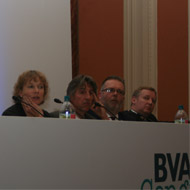Vets vote on the top issues facing the profession

The two most popular subjects - work-life balance and maintaining standards were discussed between delegates and the panel.
"Our profession is facing enormous change," said Adi Nell, past president of the Society of Practising Veterinary Surgeons (SPVS) at the BVA's Congress in London yesterday (November 20). "Not only is that change very wide ranging, but it is happening at a rapid pace."
During a session on the state of the veterinary profession, Mr Nell introduced five themes that are repeatedly discussed, prompting particular interest or anxiety among veterinary professionals.
Delegates were asked to vote on the theme that was most important to them. The two most popular subjects - work-life balance and maintaining standards - were then discussed between delegates and a panel of five.
Mr Nell said in an increasingly female profession, a growing number of vets want a better work-life balance and flexible working hours.
Panel member Myfanwe Hill, a recent RVC graduate, said the issue applies to both genders and raised concerns that the profession is failing to recruit male undergraduates and failing to provide flexible working.
"We really need to be looking at addressing these challenges. We need to take gender out of the equation and look at the wider problems".
Editor of Vet Record and InPractice Martin Alder also sat on the panel. He agreed that it is not just a problem for the veterinary profession, noting work-life balance for women in academia has been a concern for some time. He questioned whether it is too difficult for women to return to the veterinary profession after raising a family. If so, he said the structure of the profession needs to change.
Mark Welch of Companion Care quoted the statistic that a fifth of new graduates leave their first job within a year, while RCVS president Stuart Reid said one survey found 43 per cent of vets said they would not have joined the profession if they had the chance again, though it is not known how representative of the profession those figures are.
Lack of support and flexibility was highlighted as a possible reason for vets becoming disillusioned, while Ms Hill said changes are needed in the way students are recruited. Past president Robin Hargreaves also highlighted a lack of positive feedback from clients as a possible cause for disillusionment.
Voting on the extent to which practice will have to accept part-time working, the majority of delegates felt it would become the norm. However, they were divided on how ready they were for the change.
The discussion then moved on to the second topic - how the standard of care expected by clients can be preserved, how the profession can maintain graduate training and the effect of a rising number of graduates on EMS placements.
Discussions on this subject were wide-ranging, including whether vets should be trained to deal with vulnerable clients and if it is possible to do the subject justice in a veterinary degree.
The remaining three topics were then discussed briefly among delegates and the panel. They were: business skills and knowledge - where veterinary surgeons gain the skills and knowledge needed to run a business; corporate practices - what are the threats and opportunities; and growing the market - how we can increase the size of the market.
Finally, votes were taken on a number of issues to gauge delegates perspectives on the state of the profession. A majority said practice owners need to improve their business, while delegates were divided on how corporate practices have impacted the profession.
For more information on the findings from the state of the profession session, see the next issue of Veterinary Practice Today.



 FIVP has shared a survey, inviting those working in independent practice to share their views on the CMA's proposed remedies.
FIVP has shared a survey, inviting those working in independent practice to share their views on the CMA's proposed remedies.